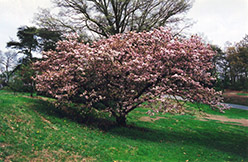It's all about ...
plants

Takasago Flowering Cherry
Prunus sieboldii
Height: 20 feet
Spread: 20 feet
Sunlight:
![]()
Hardiness Zone: 6b
Other Names: Naden Japanese Cherry
Description:
A wonderfully charismatic flowering ornamental for the discerning gardener with delicious rose-pink flowers in early spring that literally enshroud the tree, an upright yet wide-spreading habit of growth and ornamental bark
Ornamental Features
Takasago Flowering Cherry is bathed in stunning clusters of lightly-scented pink flowers with ruby-red eyes along the branches in early spring, which emerge from distinctive rose flower buds before the leaves. It has dark green deciduous foliage which emerges coppery-bronze in spring. The pointy leaves turn an outstanding red in the fall. The smooth dark red bark adds an interesting dimension to the landscape.
Landscape Attributes
Takasago Flowering Cherry is a deciduous tree with a more or less rounded form. Its average texture blends into the landscape, but can be balanced by one or two finer or coarser trees or shrubs for an effective composition.
This tree will require occasional maintenance and upkeep, and is best pruned in late winter once the threat of extreme cold has passed. Gardeners should be aware of the following characteristic(s) that may warrant special consideration;
- Disease
Takasago Flowering Cherry is recommended for the following landscape applications;
- Accent
- Shade
Planting & Growing
Takasago Flowering Cherry will grow to be about 20 feet tall at maturity, with a spread of 20 feet. It has a low canopy with a typical clearance of 2 feet from the ground, and is suitable for planting under power lines. It grows at a medium rate, and under ideal conditions can be expected to live for 50 years or more.
This tree should only be grown in full sunlight. It does best in average to evenly moist conditions, but will not tolerate standing water. It is not particular as to soil pH, but grows best in rich soils. It is highly tolerant of urban pollution and will even thrive in inner city environments, and will benefit from being planted in a relatively sheltered location. This species is not originally from North America.
This plant is not reliably hardy in our region, and certain restrictions may apply; contact the store for more information.
